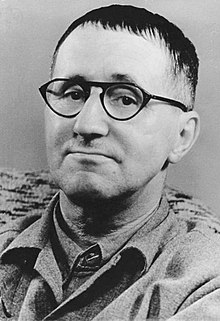Bertoldt Brecht
| Bertolt Brecht | |
|---|---|

Bertolt Brecht
|
|
| Born | Eugen Berthold Friedrich Brecht 10 February 1898 Augsburg, Bavaria, German Empire |
| Died | 14 August 1956 (aged 58) East Berlin, East Germany |
| Occupation | Playwright, theatre director, poet |
| Nationality | German |
| Genre | Epic theatre · Non-Aristotelian drama |
| Notable works | |
| Spouses |
|
| Children |
|
|
|
|
| Signature | |
Eugen Berthold Friedrich "Bertolt" Brecht (/brɛxt/;German: [bʀɛçt]; 10 February 1898 – 14 August 1956) was a German poet, playwright, and theatre director of the 20th century.
Living in Munich during the Weimar Republic, he had his first successes with theatre plays, whose themes were often influenced by his Marxist thought. He was the main proponent of the genre named epic theatre (which he preferred to call "dialectic theatre"). During the Nazi period and World War II he lived in exile, first in Scandinavia and then in the United States. Returning to East Berlin after the war, he established the theatre company Berliner Ensemble with his wife, long-time collaborator and actress Helene Weigel.
Eugen Berthold Friedrich Brecht (as a child known as Eugen) was born in February 1898 in Augsburg, Bavaria, the son of Berthold Friedrich Brecht (1869–1939) and his wife Sophie, née Brezing (1871–1920). Brecht's mother was a devout Protestant and his father a Roman Catholic (who had been persuaded to have a Protestant wedding). The modest house where he was born is today preserved as a Brecht Museum. His father worked for a paper mill, becoming its managing director in 1914.
Due to his mother's influence, Brecht knew the Bible, a familiarity that would have a lifelong effect on his writing. From her, too, came the "dangerous image of the self-denying woman" that recurs in his drama. Brecht's home life was comfortably middle class, despite what his occasional attempt to claim peasant origins implied. At school in Augsburg he met Caspar Neher, with whom he formed a lifelong creative partnership. Neher designed many of the sets for Brecht's dramas and helped to forge the distinctive visual iconography of their epic theatre.
...
Wikipedia
